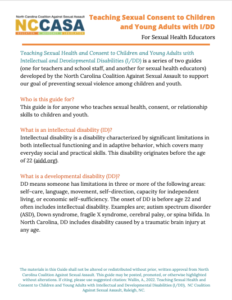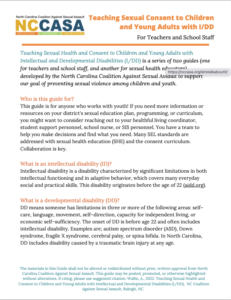While I was co-facilitating the NC Sexual Violence Prevention Advisory Council with the State Health Department, one of our focuses in the K-12 Youth Prevention working group was children and youth with intellectual and developmental disabilities. Because this population is often erroneously assumed by the adults in their lives to be asexual and because of the lack of appropriate materials for teaching, they often do not receive adequate, accessible sexual health education. For all children, lack of access to comprehensive sexual education increases vulnerability to experiencing or perpetrating sexual harm or abuse, and this is no different with children who have intellectual and developmental disabilities. They will have questions and curiosity about their bodies and about sex, and they deserve information to help them take care of themselves and keep themselves safer.
There are great strides being made towards understanding sexual health needs of this population, creating curriculum, and ensuring that they have access to information. While we were not interested in creating an independent curriculum for teaching consent, sexual health, and healthy relationships, we did want to create resources that could support professionals already working with this population or doing sexual health education to better understand how to support them. We developed a plan to create one resource for teachers and school staff who work with students with I/DD to help them better understand sexual health education, and one for sexual and relationship health educators to help them better understand the learning needs of this population.
As it turns out, it was the fabulous employee I supervised who took the outlines I’d created and built them out into useful tools, in collaboration with the members of the SVPAC’s K-12 workgroup members. It was a joy to be part of this project!
supervisor, collaborator


